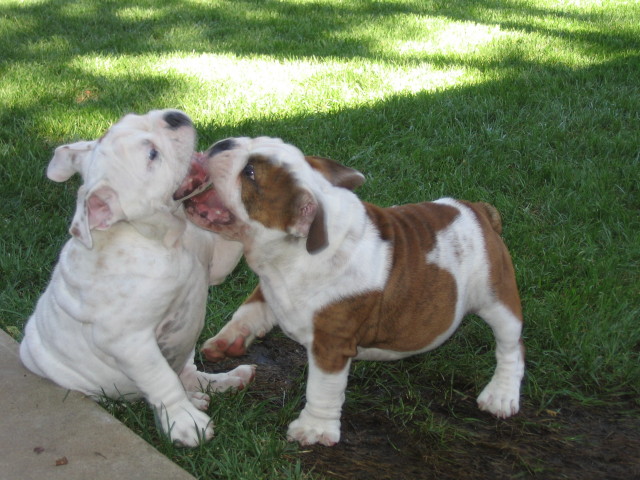QuestionI have two English bulldogs both 2 yrs. of age. At 12 months one lost hair on both sides and a small patch on her hip during her heat. The hair did not grow back. At eighteen months during another heat cycle both lost hair again. The first dog has more hair loss than the second.
The skin on both dogs has darkened where they lost hair. They are not itchy. Ringworm, mange, mites, fungal and bacterial issues were ruled out by our vet. She concluded that it was seasonal hair loss and nothing to worry about. These dogs are from the same litter. Their mother had some hair loss during her first heat cycle but regained it and has never had a problem since. Our vet did suggest fish oil added to their diet. Initially these caused problems with diarrhea but I changed to salmon oil and they have no problem with it. Yet it has not helped them to regain hair. They have no pustules, dryness, scabs, flaking or other problems. In fact the rest of their skin and coat is great. Is there something else we should check? What tests should be run or is there a medication we should try?
AnswerThere is a condition, known as "seasonal flank alopecia" which occurs in some breeds.
This condition usually is seasonal and occurs in some dogs during the colder months and other dogs during the warmer months. It should clear up at least part of the year. There is hairloss on the flanks and the skin does get darker.The usual recommendation is not to treat this condition the first time it occurs because sometimes it doesn't come back.
If it does come back the next time the season that is associated with it rolls around, then it might be worth trying melatonin. The references to using melatonin
recommend an injectable version of melatonin and I have no idea if oral melatonin would work as well, or at all.
The other thing to consider is other hormonal disease. Hyperadrenocortism is a fairly common cause of hairloss and increased skin pigmentation and there are other hormonal disorders that can cause similar signs. It seems
reasonable to me to try to rule out this condition prior to looking for one that is more rare. Your vet may have already done this or may have good reason not to consider hyperadrenocorticism but it would be worth asking
about it.
Last but not least, this can be associated with hypothyroidism as well. A simple T3/T4 blood test can rule this out, or in.

 English Bulldog puppy has scabs on her back
QuestionI have a 9 month old female english bulldog I f
English Bulldog puppy has scabs on her back
QuestionI have a 9 month old female english bulldog I f
 My English Bulldog, Rocco
Question
Rocco
Hello, I am a owner of a English Bulldog
My English Bulldog, Rocco
Question
Rocco
Hello, I am a owner of a English Bulldog
 House Training a bulldog pup ; and bulldog pup food ;
QuestionQUESTION: Hi,
My girlfriend and I adopted a bu
House Training a bulldog pup ; and bulldog pup food ;
QuestionQUESTION: Hi,
My girlfriend and I adopted a bu
 5 yr old English BD, skin rash; probiotics for bulldog; yeast overgrowth bulldog;
QuestionQUESTION: My BD has had an ongoing rash on his
5 yr old English BD, skin rash; probiotics for bulldog; yeast overgrowth bulldog;
QuestionQUESTION: My BD has had an ongoing rash on his
 English Bulldogs male and female fighting
QuestionI have a 8 month old female English bulldog and
English Bulldogs male and female fighting
QuestionI have a 8 month old female English bulldog and